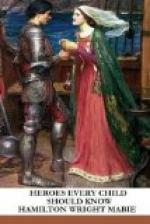“Well, thou hast spoken frankly,” said Gessler; “and since I have promised thee thy life I will not swerve from my word. But as I have now reason for personal apprehensions from thy malice, I shall closet thee henceforth so safely in the dungeons of Kussnacht, that the light of sun or moon shall never more visit thine eyes; and thy fatal bow shall hereafter be harmless.”
On this the guard once more laid hands on the intrepid archer, whom they seized and bound, in spite of the entreaties of Lalotte, and the cries and tears of little Henric, who hung weeping about his father.
“Take him home to his mother, Lalotte; and bear my last fond greetings to her and the little ones, whom I, peradventure, shall see no more,” said Tell, bursting into tears. The mighty heart which had remained firm and unshaken in the midst of all his perils and trials, now melted within him at the sight of his child’s tears, the remembrance of his home, and anticipations of the sufferings of his tender wife.
The inhuman Gessler scarcely permitted his prisoner the satisfaction of a parting embrace with Henric and Lalotte, ere he ordered him to be hurried on board a small vessel in which he embarked also with his armed followers. He commanded the crew to row to Brunnen, where it was his intention to land, and, passing through the territory of Schwyz, to lodge the captive Tell in the dungeon of Kussnacht, and there to immure him for life.
The sails were hoisted and the vessel under weigh, when suddenly one of those storms common on the lake of Uri overtook them, accompanied with such violent gusts of wind, that the terrified pilot forsook the helm; and the bark, with the governor and his crew, was in danger of being ingulfed in the raging waters. Gessler, like most wicked people, was in great terror at the prospect of death, when one of his attendants reminded him that the prisoner, William Tell, was no less skilful in the management of a boat than in the exercise of the bow. So he ordered that Tell should be unbound, and placed at the helm.
The boat, steered by the master-hand of the intrepid Tell, now kept its course steadily through, the mountain surge; and Tell observed, “that by the grace of God, he trusted a deliverance was at hand.”
As the prow of the vessel was driven inland, Tell perceived a solitary table rock and called aloud the rowers to redouble their efforts, till they should have passed the precipice ahead. At the instant they came abreast this point he snatched his bow from the plank, where it was lying forgotten during the storm, and, turning the helm suddenly toward the rock, he sprang lightly on shore, scaled the mountain, and was out of sight and beyond reach of pursuit, before any on board had recovered from consternation.
Tell, meantime, entered Schwyz, and having reached the heights which border the main road to Kussnacht, concealed himself among the brushwood in a small hollow of the road, where he knew Gessler would pass on his way to his own castle, in case he and his followers escaped and came safely to shore. This, it appeared they did, and having effected a landing at Brunnen, they took horse, and proceeded towards Kussnacht, in the direction. of the only road to the castle.




